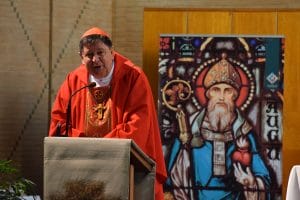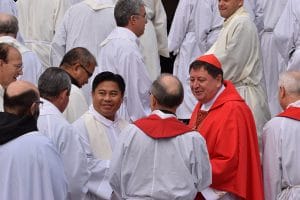Cardinal Joao Braz de Aziz, Prefect of the Congregation for the Institutes of Consecrated Life and the Societies of Apostolic Life, on October 17, Monday, celebrated the Eucharist in the residence in Via de Monte Cucco at the outskirts of Rome, where the 55th General Chapter was being held. In his homily he addressed the friars reminding them of certain problems today challenging the consecrated persons and encouraging all present to “live the life of Christ, not the other life that we had already left behind.”
The words during the homily of Cardinal Joao Braz de Aziz, reverberated in the hearts of the Capitulars reminding them of the issues which in the earlier months were being debated during the works and consultations preceding the General Chapter.
“The condition of disciple,” indicates Card. Braz, “is central for the consecrated person.” “What identifies the disciple of Jesus is the testimony which he gives of the person of Jesus.” And it is there where the letter of the Constitutions of the Order, the theory many times assimilated in intellectual form, should pass into to become life, fecund life. “We, the consecrated, who left our past life behind us, with time are in danger of beginning to appropriate as our own the things of God. In this way, our heart again becomes perverse. It does not allow the light to pass through so that the Gospel move the life forward.” “We, the consecrated, are called to live the life of Christ, not the life that we had left behind.” “In our life there is a bit of the Gospel and a bit of culture, a mixture quite difficult to reconcile.”
Another theme emphasized in the homily was the importance of the community: “We the consecrated are called to be disciples from the community.” Only from the perspective of community does everything have meaning.
The Cardinal also highlighted that “one of the great problems of our conversion is money, the possession of material goods. Many times we trust more on the bank accounts than on the Providence of God. Not everything is calculated with the criteria of the Gospel.”
He announced a coming (conference?) for the month of November, organized by the CIVCSVA which will delve more profoundly into the professional aspect of dealing with possessions and the evangelical criteria for the use of such goods. He noted that “it is a subject that we must treat again with greater depth.”
Nevertheless, Cardinal Braz underlined a way of hope: “At this moment a light of hope has been enkindled for historical charisms. Perhaps motivated by the Year of the Consecrated Life and the necesariacardinal_braz_de_aviz_o5revision of our charisms that is being realized. We must continue on this road. But the most necessary thing is to be in love with the Lord. That glance which the Lord threw at us one day which penetrated the depth of our heart. That must be maintained alive, it must never disappear. It is something we must always face in our life: there is the strength and the beauty, the joy, the capacity to conquer the problems.” “The Gospel, he continues, does not deceive us, but the problem sometimes is that we were placed by the Lord in the road of promises. The danger is that we remain in a state of mediocrity; we are guided by the customs, or by what we inherited from the past. We need the purity of witnessing. Thus the importance of conversion of the heart.”
Summarizing the great conclusions of the Year of the Consecrated Life, he underlined three points that today manifest the Consecrated Life: First, the necessity to “believe in fraternal life and find deeper reasons to motivate this fraternal road. When we in common life begin to defend much our individual mode of living, this in time will generate difficulties, personal and communitarian. Furthermore, today an individual spirituality is incapable of enkindling a light that will allow the other person to comprehend that the path of Jesus is good. It is necessary to make the community life that light. This is the way by which Jesus can be accepted as the light of the world.” “For this reason, we cannot stop in the midst of the difficulties we encounter. We have to recover the relationship with the community as something fundamental. We must have the courage not to receive the Eucharist if we are not united. There is need to face the brother, such maturity is necessary.



